This
page describes Gena Rowlands’s response to Ray Carney’s discovery
of the long-lost first version of Shadows. To read an account
of that discovery, click
here.
To learn more about Rowlands's attempts to confiscate the print and prevent
it from being screened, click
here to read excerpts from interviews Professor Carney has given on
this subject. To read a 2008 interview with a New Zealand magazine where Ray Carney talks about her attempts to suppress or withhold other items, including Cassavetes' manuscripts and film prints from circulation, click here.
If
Rowlands's or Criterion's response seems puzzling, click
here to
read about how money and celebrity drive the distribution and video
release situation in American film releasing and how money motivates
many of Gena Rowlands's and Al Ruban's actions.
Another
reason for Rowlands treatment of Prof. Carney is her attempt to prevent
him from telling the truth about John Cassavetes' life and work. Rowlands
is devoted to perpetuating a myth about her husband's life and conduct
and resentful of Prof. Carney for not sticking to the party line. Click
here
for a glimpse of what Cassavetes was really like as a person and an illustration
of the kinds of facts that Rowlands is retaliating against Carney for
revealing. Her treatment of his Shadows and Faces finds,
and her insistence that Criterion remove his name from the Cassavetes
box set that he spent more than eight months helping to create are part
of her attempt to silence him.
To
read a chronological listing of events between 1979 and the present connected
with Ray Carney's search for, discovery of, and presentation of new material
by or about John Cassavetes, including a chronological listing of the
attempts of Gena Rowlands's and Al Ruban's to deny or suppress Prof. Carney's
finds, click
here.
To read another
statement about why Gena Rowlands or anyone else who acted in Cassavetes'
films or someone who knew Cassavetes is not the ultimate authority on
the meaning of his work or on how it should be cared for or preserved,
click
here.
To read about
Carney's being blackballed by Rowlands from contributing to another DVD
project, and about Seymour Cassel's being put in his place and, at Rowlands's
behest, making (foolish and incorrect) comments that "there is no
first version of Shadows" in the voice-over commentary to
the Shadows disk, click
here.
To read about other unknown Cassavetes material (including recording studio master tapes and an unknown film by Cassavetes) Ray Carney has discovered, click here.
Click
here for best printing of text
The
Response–
Denial, Hostility, "Remove all references from your web site"
I am sorry to say that when
I communicated my discovery of the first version of Shadows to
Gena Rowlands, she told me that she had no knowledge that Cassavetes
had made a first version of the film. It was news to her. She then
denied the importance of what I had found - in fact, when I referred
to the print as "the first version," she got upset with me
and denied that there was anything called "the first version." She told me to remove all references to "the first version" from my web pages. Mentions of it were to be expunged. I was not to refer to it. (As evidence of the falsity of Rowlands's position, and proof not only that there is a "first version" of Shadows, but that it is a complete and finished work of art, not a work in progress or a rough assembly, click here to view three brief video clips from the movie.)
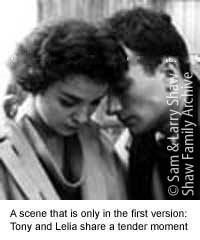 It
became clear as I spoke with her that she had virtually no knowledge
or memory of the production or screening history of the film. She didn't
know Amos Vogel from Jonas Mekas, the 1958 screenings from the 1959
ones, or one edit from another. When I referred her to my BFI book
(which I had sent her a copy of several years before), she told me
that she had never read it. When I referred her to my Cassavetes
on Cassavetes book, which I had sent her complimentary copies
of three years earlier, she told me she hadn't opened it either. (Click
here to go to the John Cassavetes Pages and read selections from
my interviews and writing about Cassavetes.) It
became clear as I spoke with her that she had virtually no knowledge
or memory of the production or screening history of the film. She didn't
know Amos Vogel from Jonas Mekas, the 1958 screenings from the 1959
ones, or one edit from another. When I referred her to my BFI book
(which I had sent her a copy of several years before), she told me
that she had never read it. When I referred her to my Cassavetes
on Cassavetes book, which I had sent her complimentary copies
of three years earlier, she told me she hadn't opened it either. (Click
here to go to the John Cassavetes Pages and read selections from
my interviews and writing about Cassavetes.)
Even more unfortunately, she
clearly wasn't interested in learning about any of the things she didn't
know. Her mind was made up. I was not to confuse her with the facts. I
spent hours over the next few months gently trying to persuade her, talking
to her and, subsequently, writing and sending her background information
about the history of the film and the print (including sending her the
text of the essay I wrote about my 17-year search for and discovery of
the print, an essay which includes both Jonas Mekas's and Cassavetes'
acknowledgements of the first version of Shadows as a completely
independent cinematic work different from the second version -- click
here to read this essay), but throughout it all, she has refused to
change her view. She still denies that anything called "the first
version of Shadows" ever existed or has now been found.
She refuses to allow public screenings or a video release of the print
I found. As she has told me and dozens of film festival programmers, exhibitors,
and releasers I have asked to contact her about the print: "There
is no first version of Shadows. The released version is the only
print that should ever be screened." End of educational campaign.
End of first version. End of story.
Strangely enough, there had
been a precedent in our relationship for this sort of response. Her
attitude toward the Shadows find was a repeat of her response
toward my earlier discovery of the alternate version of Faces in
the Library of Congress. (Click
here for information about that discovery and click
here for information about Gena Rowlands's response.) In that case,
she similarly refused to let the print be screened or to be issued
on video. She similarly told me not to announce the discovery or discuss
it with anyone else. As with Shadows, her goal was not merely
to ignore the print, but to suppress it and even suppress knowledge
of it. It didn't matter. It was nothing. It didn't exist.
But that was not the worst
of her response to the Shadows discovery. In my conversation
with Rowlands about Shadows she ominously instructed that
I should immediately turn the print and any copies over to her. She
told me her goal was to repossess the material to make sure that it
would never be screened by anyone, anywhere.She told me that she would
suppress or even destroy the print if necessary to keep it out of circulation.
When I hesitated to comply with her orders, the business manager of
the estate, a man named Al Ruban, followed up with written orders to
the same effect. When I didn't turn over the print voluntarily, I received
a "lawyer's letter" stating that Rowlands was taking legal
action to seize it. (Click here to read the text of a letter written by Al Ruban at Gena Rowlands's behest to the Criterion Collection to prevent the print of the first version of Shadows from being released on video followed by the response from Criterion.)
I
have been put in a difficult situation. As much as I would like to
oblige Rowlands, she has made her intentions clear. If I turn over
the print, she has told me her goal is that it will never be seen again.
She has told me that it will never be screened publicly. She has told
me that it will never be released on video. She has suggested that
it might even be destroyed to keep it from being seen. Consequently,
I have chosen to hold onto it. Even if it can't be seen during Rowlands's
lifetime, it will be preserved for future generations. To protect the
print, I have been forced to hire a lawyer and spend money I do not
have, but I am doing it to save it from suppression, loss, or destruction.
I am doing it for posterity. I am doing it for John. To save one of
his films for future generations.
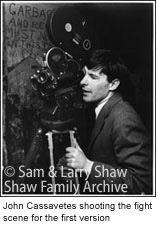 Although I have been been advised by intellectual property lawyers that the first version of Shadows is completely and absolutely free of copyright restrictions on its screenings, that Rowlands has no legal grounds for her claim to confiscate the print or control the screenings, and that I am consequently free to screen and distribute it any way I choose, Rowlands's threats of legal action have discouraged exhibitors from showing the print. When it comes to legal matters, you don't have to be in the right to beat someone; you just have to make enough threats to scare other people away. That's the way our legal system works. It's not about being right, or winning in court, but about intimidating people into going along with what you want, or bankrupting someone like me who tries to fight for what is right. (Click here to read more about this issue.) Discovering a lost masterpiece is turning out to be a more expensive proposition than I had bargained for. I already spent a lot of money finding the print and now I have to spend a lot more because Rowlands and Ruban have lawyers working against me to confiscate it. I recently had to go out and get several of my own to deal with theirs. I'll have to ask mine if I can have a bucket placed somewhere in the back of my classroom at future screenings labeled "Contributions to the Shadows Defense Fund." Although I have been been advised by intellectual property lawyers that the first version of Shadows is completely and absolutely free of copyright restrictions on its screenings, that Rowlands has no legal grounds for her claim to confiscate the print or control the screenings, and that I am consequently free to screen and distribute it any way I choose, Rowlands's threats of legal action have discouraged exhibitors from showing the print. When it comes to legal matters, you don't have to be in the right to beat someone; you just have to make enough threats to scare other people away. That's the way our legal system works. It's not about being right, or winning in court, but about intimidating people into going along with what you want, or bankrupting someone like me who tries to fight for what is right. (Click here to read more about this issue.) Discovering a lost masterpiece is turning out to be a more expensive proposition than I had bargained for. I already spent a lot of money finding the print and now I have to spend a lot more because Rowlands and Ruban have lawyers working against me to confiscate it. I recently had to go out and get several of my own to deal with theirs. I'll have to ask mine if I can have a bucket placed somewhere in the back of my classroom at future screenings labeled "Contributions to the Shadows Defense Fund."
Such is life. And I had thought
Rowlands would thank me! How dumb could I be? I'm convinced John is
looking down on all of this and cackling away with that inimitable
giggle of his. I know what he thought of lawyers and law suits. Keep
laughing and smiling along with him. What fools we mortals be.
Shades
of Norma Desmond
If you can't control someone, then destroy or undermine them
with censorship, suppression, firing, threats of law suits
Friends have asked me how
Rowlands could possibly be so unappreciative of the Shadows discovery–or
the earlier Faces one. As one acquaintance put it, “Even
with the Beatles they release the tapes of their recording sessions.
She has to know that. This is something even much more valuable and
interesting than that. She should be delighted that you found this
material. What’s really going on? It can’t all
really be about Shadows. There must be something else.” Well,
although I’ve been reluctant to talk about the “other issues” publicly
up till now, recent events, both those concerning the Shadows and Faces discoveries,
and another event which I will describe below, prompt me to. Something
else has been going on for a long time–in fact, going on for
fifteen years by this point. Ever since Cassavetes’ death Rowlands
has tried to control what I have said and written about her husband.
She lives in fear of certain things coming out. She wants to muzzle
me. Even if she doesn't read my writing about her husband (see the
previous section on this page for information about that or click
here to go to the John Cassavetes Pages and read selections from
my interviews and writing about Cassavetes), the business manager of
the estate, Al Ruban, keeps her informed of potential “hot spots” within
it. I have been told to change things, to remove things, to censor
what I have written. And when I have refused, she and he have retaliated.
To the best of my memory,
the problem started back around 1990. I remember Ruban calling me and
telling me that he had seen the advance text of an article about Cassavetes
that was to appear in The New York Times, where an observation
by me was quoted concerning Cassavetes’ discouraged emotional
state in the late 1970s and early 1980s following the failure of The
Killing of a Chinese Bookie and Opening Night. Ruban,
who is never known for his tact, blew his stack at me. He was extremely
abusive. Swearing and yelling, he told me that Rowlands insisted I
call up the writer and have the statement removed before the article
appeared in print. She insisted on only “happy stories.”
I told him I would not make
the call. I told him that the statement was correct. It was based on
a conversation with Cassavetes. I told him I refused to serve as a
lap dog, putting out a sanitized, “authorized” version
of the filmmaker’s life. My writing on Cassavetes has never been
in a muck-raking vein; I have tried to respect the privacy of his and
Rowlands’ personal lives; but where there were important artistic
issues at stake, in this instance, questions about the emotional state
of an artist and how it impacted his work, I refused to disseminate
the happy-face narrative that Rowlands was determined to promulgate.
Though I was initially slow
to understand what happened after that, it became clear to me much
later that that conversation was a turning point in my relationship
with Rowlands and Ruban. They decided that if they could not control
my comments, they would systematically attempt to discredit and marginalize
my work.
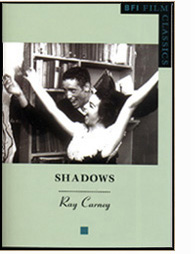 Ruban
began mounting a series of increasingly vehement attacks on my writing
in public forums: he mocked my books at film event question-and-answer
sessions; he blocked my attendance at events connected with Cassavetes’
work (demanding that invitations for me to attend festivals or screenings
be withdrawn on the penalty that Rowlands would pull the films if I were
allowed to be present); he wrote to the publishers of my books vaguely
threatening action against them. At the same time, he also launched a
whispering campaign against me. Calls came into me on an almost monthly
basis from various film professionals–festival directors, archive
programmers, and university preservationists–reporting Ruban’s
comments about how Rowlands was “unhappy” with my work. As
I gave a single illustration of above, Rowlands on her part began objecting
to things on my web site and in my writing. Though she never actually
bothered to read my books (see the previous section on this page for more
about that), she read reviews of them and Ruban fed her selected "objectionable"
excerpts. She wanted the objectionable material removed. Ruban
began mounting a series of increasingly vehement attacks on my writing
in public forums: he mocked my books at film event question-and-answer
sessions; he blocked my attendance at events connected with Cassavetes’
work (demanding that invitations for me to attend festivals or screenings
be withdrawn on the penalty that Rowlands would pull the films if I were
allowed to be present); he wrote to the publishers of my books vaguely
threatening action against them. At the same time, he also launched a
whispering campaign against me. Calls came into me on an almost monthly
basis from various film professionals–festival directors, archive
programmers, and university preservationists–reporting Ruban’s
comments about how Rowlands was “unhappy” with my work. As
I gave a single illustration of above, Rowlands on her part began objecting
to things on my web site and in my writing. Though she never actually
bothered to read my books (see the previous section on this page for more
about that), she read reviews of them and Ruban fed her selected "objectionable"
excerpts. She wanted the objectionable material removed.
My
mailbag is full of reports of Al Ruban's gratuitous bashing of my
scholarship and publications at public events from 1990 through
the present. As objective evidence from outsiders who have no particular
allegiance to me or my work, three reports follow that I received
from individuals who don't know each other who were each present
at post-screening question-and-answer sessions of Cassavetes' work.
The first and last events took place in New York; the middle event
in Los Angeles. Since all three are filmmakers or film industry
professionals, I have withheld their names to protect their identities.
(I'd also point out that many of these attacks preceded my discoveries
of new Cassavetes material. When I found the new prints of Faces
and Shadows, Ruban's and Rowlands's denigrations of my
work became even more frequent and more abusive. I said nothing
publicly about any of this for almost fifteen years.)
Date: Mon, 02 Jun 2003
Hey Prof. Carney-
Just wanted to let you
know that I recently met AL Ruban at a screening of A woman under
the influence and Minnie and Moskowitz at the Two Boots Pioneer
theater on 2nd Ave in NYC. Ruban was a complete asshole and when
I asked a question regarding something from your book "C on
C", he condemned you as an "intellectual jerk". Something
tells me that this guy either has something to hide or is really
insecure.
Thanks, hope all is well.
Name Withheld
Date: Sun, 28 Jul 2002
Subject: al ruban
Ray, just returned from
the UCLA screening of (the second version of) Shadows. Curtis Hanson
introduced. Talked about first meeting JC during editing of Faces.
Didn't he make LA Confidential? Seems, then, he didn't learn anything
from his time with JC. Goldoni, Rowlands, Ruban and Cassel there.
Something you might want
to hear, through I'm sure you know his attitude: Ruban explained
that the version we saw tonight (ie. at UCLA) was the real film:
'This is the film, it's always been the film.' Ruban seemed rather
scornful of critics/historians, and your work in particular, saying
things like (I'm paraphrasing here): enjoy the film for what it
is, don't worry about what color underpants people were wearing.
One question from the audience mentioned your name, to which Ruban
replied, 'Ray Carney wasn't there'. So, there you have it.
Name Withheld
Date: 15 Dec 2001
Prof. Carney:
What's up with Al Ruban?
I was at an event where people cited your work on Cassavetes in
the q-and-a (all very favorable, I think some of them might have
been your students) and he launched into this ferocious attack saying
(words pretty close to): "How can Carney claim to know what
Cassavetes meant? He wasn't there to ask him. A critic has no business
telling us what a film is about or what a director was thinking
unless he was there. Carney wasn't there." A few minutes later
he called your Shadows book a "study of underwear" and
said "who cares what underwear people are wearing!" I
have to tell you the whole tirade (and it went on and on) caught
the audience completely by surprise. Everyone was stunned. He seemed
really mad. It pretty much brought the discussion to a halt. No
one wanted to ask any more questions until the moderator calmed
him down by making a joke. I want you to know though that the audience
was on your side. Someone beside me whispered "he's jealous,"
and when we were filing out someone else made a joke about "that's
the way all producers are." He sure put a damper on the evening.
What gives with him? What is his problem?
Name Withheld |
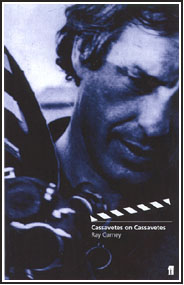 For
more than a decade, I tried to take the high road. I kept my mouth shut
and declined to go public about the character assassination and attempts
to censor me. I confined my protests to private conversations with Rowlands
and letters describing Ruban’s latest outrageous statement about
me at a festival or to a programmer or archivist. My feeling was that
as long as the situation only affected my personal situation, I would
attempt to rise above it. I was a big boy. I would lick my wounds and
go on telling the truth to the best of my ability. That is how things
stood until recently. For
more than a decade, I tried to take the high road. I kept my mouth shut
and declined to go public about the character assassination and attempts
to censor me. I confined my protests to private conversations with Rowlands
and letters describing Ruban’s latest outrageous statement about
me at a festival or to a programmer or archivist. My feeling was that
as long as the situation only affected my personal situation, I would
attempt to rise above it. I was a big boy. I would lick my wounds and
go on telling the truth to the best of my ability. That is how things
stood until recently.
But the situation changed
with Rowlands's and Ruban’s decision to prevent screenings of
the newly discovered prints of Faces and Shadows and
with their efforts to prevent me even from announcing the finds on
my web site or elsewhere. It was no longer merely about me. It was
an attempt to rewrite history and prevent valuable work from being
seen. In terms of my writing in Cassavetes on Cassavetes and
the Shadows book, there were also important issues at stake
in terms of the understanding of Cassavetes’ biography and work.
Rowlands is committed to a happy-face version of her husband’s
life and a Mickey Rooney “let’s put on a show” version
of the making of his films. She has convinced many others to go along
with it. I am committed to another vision–to telling the truth
in all of its emotional and psychological complexity. That is ultimately
what Rowlands and Ruban are attempting to stop. That is ultimately
why they are gunning for me. That is the context in which the suppression
of the Shadows and Faces prints and the attempts
to silence me must be understood.
Do we want accounts of Cassavetes’ life
and work to be controlled by (and censored by) his widow? Do we want
Cassavetes’ life to be Hollywoodized? Is everything reducible
to the value system of Entertainment Tonight? Does the fact
that Rowlands is a highly paid, popular movie star give her the right
to dictate what is said and written about Cassavetes? Does it give
her the right to censor my work and bring in a team of lawyers against
me? Does everything in film come down to who has the money and power?
I wish I could say it doesn’t; but it is no secret that celebrity
and wealth count for almost everything in American film culture. I
have had firsthand experience of that in recent months when, in response
to the events I have described, I have appealed for support from an
important person–a film festival director, a programmer, another
film director, an important critic. Virtually everyone I have contacted
has told me that he or she not only believes and sympathizes with what
I have experienced, but has independent evidence of similar actions
on Rowlands’ part against others in the past; but they then invariably
add that they are so sorry, but they can’t help me, because: "I
have a relationship with her and don't dare alienate her." "I
am afraid she will retaliate against our institution and we need her
support." "We can't risk it because we are counting on her
making a donation to the university when she dies." "I agree
but we are afraid she might not let us show a Cassavetes film at a
future event." Etc. Etc. It’s not a very encouraging state
of affairs. Money and power talk. The truth goes begging.
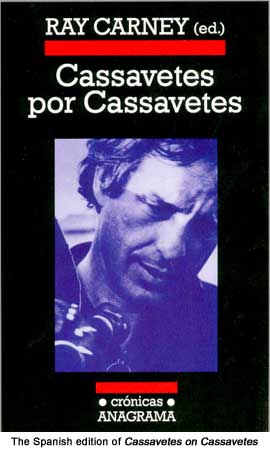 I
am a realist. I realize that going public at this point will probably
change nothing. As a mere teacher and writer, I know I have almost no
chance of winning a battle with a famous actress. All of the power, all
of the money, all of the film professionals (interested in maintaining
an amicable relationship with a big movie star) are on the other side.
But there are important issues at stake. Can the truth be bought and sold?
Does the fact that someone is a movie star give her the right to censor
what is written and said and thought by a critic? Is this what we really
want for the future of film study? Is it all about flattering the rich
and famous? I
am a realist. I realize that going public at this point will probably
change nothing. As a mere teacher and writer, I know I have almost no
chance of winning a battle with a famous actress. All of the power, all
of the money, all of the film professionals (interested in maintaining
an amicable relationship with a big movie star) are on the other side.
But there are important issues at stake. Can the truth be bought and sold?
Does the fact that someone is a movie star give her the right to censor
what is written and said and thought by a critic? Is this what we really
want for the future of film study? Is it all about flattering the rich
and famous?
For the
record, here is one final illustration of Rowlands’s response
to my attempts at truth-telling. For the past eight months I have served
as the scholarly advisor to Criterion Video for their upcoming Cassavetes
box set. I have devoted an enormous amount of time and effort to making
sure that every aspect of the project was done to the highest possible
standards of excellence, advising them on the choice of prints, traveling
to New York to record audio voice-over commentary, and writing material
for the booklet to accompany the DVDs. It has been a labor of love.
I helped plan and select the contents for the box set, devoting more
than 300 hours to locating rare photographs and documentary film material
to be included on the disks, as well as outtakes from Opening Night that
have never before been seen.
I attempted to persuade Criterion,
Rowlands, and Ruban to allow the inclusion of the complete texts of
all variant versions of all of the films along with rare filmed interviews
with Cassavetes and rare filmed material showing him rehearsing and
working with actors. The films to be bundled in the box set (beyond
the outtakes of Opening Night) would have included: Tristam
Powell's documentary, the entire long version of Faces, the
first version of Shadows, and both versions of The Killing
of a Chinese Bookie. It was an uphill battle all the way. As Criterion
relayed their conversations with Ruban back to me, at every point,
Ruban (speaking for Rowlands) resisted these suggestions and shot them
down. (To be perfectly clear about the Shadows print in particular:
This was emphatically not a money issue with me. I was willing to provide
a Digibeta copy of the first version of Shadows for free to
Criterion, at no cost to them. Click on this
link for more about my views of the money side of the question.)
Ruban and Rowlands refused to allow it. They sent both me and Criterion "lawyer's
letters" forbidding the inclusion of the first version of Shadows in
the Criterion box set. Reluctantly, even though it went against my
personal wishes, I resigned myself to accepting their decision on the
matter. But that was apparently not good enough for them. They were
apparently determined to retaliate for the fact that I had wanted to
include alternate versions of Faces and Shadows at
all. (The text above this explains Gena Rowlands's response to my discovery
of the lost version of Shadows. Click
here for information about Gena Rowlands's response to my discovery
of the long version Faces.) They were apparently determined
to get back at me for the fact that I hadn't expunged references to
these prints from my work, that I hadn't taken them off my web site,
as they had told me to.
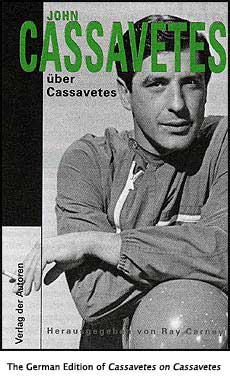 Gena
Rowands recently learned three things about my involvement in the project:
First, that my voice-over commentary on the Shadows disk mentioned
the "first version" of the film; second, that in my capacity
as advisor, I privately expressed reservations to Criterion about including
Charles Kiselyak's documentary, A Constant Forge, in the box
set (which because of its fairy-tale/soap opera rendition of Cassavetes'
life has aptly acquired the nickname of "A Constant Forgery"
among perceptive viewers); and, third, that since Kiselyak's romanticized/
Hollywoodized version of the filmmaker was going to be included in any
case, I intended to offer a different view of Cassavetes' life and work
in the written material I was providing. (To read more about Charles Kiselyak's
documentary, Ray Carney's involvement with it, and Carney's opinion of
it, click
here.) Gena
Rowands recently learned three things about my involvement in the project:
First, that my voice-over commentary on the Shadows disk mentioned
the "first version" of the film; second, that in my capacity
as advisor, I privately expressed reservations to Criterion about including
Charles Kiselyak's documentary, A Constant Forge, in the box
set (which because of its fairy-tale/soap opera rendition of Cassavetes'
life has aptly acquired the nickname of "A Constant Forgery"
among perceptive viewers); and, third, that since Kiselyak's romanticized/
Hollywoodized version of the filmmaker was going to be included in any
case, I intended to offer a different view of Cassavetes' life and work
in the written material I was providing. (To read more about Charles Kiselyak's
documentary, Ray Carney's involvement with it, and Carney's opinion of
it, click
here.)
If, as T.S. Eliot wrote, "humankind
cannot take much reality," I guess it's even more true of movie
stars than the rest of us. Rowlands's response to the above information
can be seen in the text of the following email I recently received
from Peter Becker, the President of Criterion Video concerning my work
on the project:
From: Peter Becker
President of Criterion Video
The Criterion Collection
Subject: Bad news
Dear Ray,
I'm sorry to have to tell
you that we won't be including your commentary or essay in the Cassavetes
box. Gena Rowlands feels that you have violated her rights and failed
to respect John Cassavetes' wishes, and she has informed us that under
the circumstances, she will not participate in or approve the release
with you as a part of it. Cassavetes entrusted his legacy to Gena,
so for us, her word is final. I wish it hadn't come to this.
Sincerely,
Peter
Note that this represents
denying me credit for hundreds of hours of input that is actually still
included in the Criterion Box Set. Imagine writing a book or making
a film and having your name taken off it. Imagine working for months
on a project and having it still represent most of your input and having
your name taken off it. That is what Gena Rowlands ordered be done
to me and what Peter Becker acquiesced in doing. For all their vaunted
idealism and high principles, that is what he and Criterion did to
curry favor with a movie star. When she told them to jump through her
hoops, Becker only asked "how high."
People should be asking
a few questions at this point:
1) Is it right for a filmmaker's
widow to harrass the discoverer of a new work by the filmmaker with
threats of law suits and to threaten film festivals, theaters, and
video releasers with law suits to prevent the work from being screened
(and to post false and libelous notices on web sites claiming that
the work was illegally or unethically shown by me at Rotterdam)? Is
it right for Rowlands to claim that she can destroy the work if she
wants to and to insist that I must turn over the print to her immediately?
Should a rich movie star like Rowlands be able to use her money and
legal connections to bring legal threats against me and force me to
retain a lawyer and defend myself from her claims, when in fact she
has no grounds whatsoever to claim ownership of the work or to control
its screening and is using legal maneuvers merely to harass, threaten,
and intimidate me—to tie me up legally in order to prevent the
work from being screened?
2) Should the widow of a
director have the right to censor and control the written material
or spoken commentary that appears about him? Should she be allowed
to control the critical interpretation of his work? Should she be able
prevent the publication of anything she dislikes or has not approved
in advance? Should Rowlands be able to retaliate for her inability
to confiscate and suppress the first version of Shadows by having
me fired from (and my name removed from) the Criterion box set after
I put in eight months and hundreds of hours of work on it?
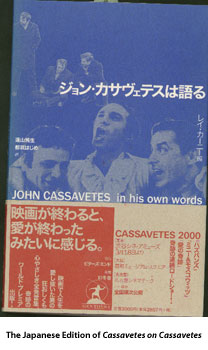 3)
What do we think of a video company like Criterion for giving Rowlands
the right to censor and control a video release in this way? What do we
think of Peter Becker for summarily firing me and removing my name from
the set, in violation of prior agreements with me, simply because Rowlands
asked him to do it? What do we think of a video company that lets a movie
star control the content of its releases? 3)
What do we think of a video company like Criterion for giving Rowlands
the right to censor and control a video release in this way? What do we
think of Peter Becker for summarily firing me and removing my name from
the set, in violation of prior agreements with me, simply because Rowlands
asked him to do it? What do we think of a video company that lets a movie
star control the content of its releases?
4) What do all of the above
things tell us about Rowlands and Becker and their values? Is deal-making
everything in film? Do money and power make all of the decisions? Is
everything in film about pleasing celebrity movie stars? Will anyone
defend the right of a film professor to think, speak, and write what
he believes? Do years of serious research and scholarship mean anything—or
does everything come down to flattering a movie star—and jumping
through hoops to please her? Is that what it's all about—so that
even film scholarship is just another form of Hollywood air-kissing?
Are essays and comments on film just a high-brow version of an Academy
Awards acceptance speech, where the supreme goal is to flatter and
stroke people in power, and yank someone off the air if they dare to
say anything that hasn't been approved by the network in advance? Are
we comfortable with a world where people like Spielberg, Stone, and
Rowlands get the right to censor what is written—even when it
is true and correct—just because they don't like it?
This
page describes Gena Rowlands’s response to Ray Carney’s discovery
of the long-lost first version of Shadows. To read an account
of that discovery, click
here.
To learn more about Rowlands's attempts to confiscate the print and prevent
it from being screened, click
here to read excerpts from interviews Professor Carney has given on
this subject. To read a 2008 interview with a New Zealand magazine where Ray Carney talks about her attempts to suppress or withhold other items, including Cassavetes' manuscripts and film prints from circulation, click here.
If
Rowlands's or Criterion's response seems puzzling, click
here to
read about how money and celebrity drive the distribution and video
release
situation in American film releasing and how money motivates many of
Gena Rowlands's and Al Ruban's actions.
Another
reason for Rowlands treatment of Prof. Carney is her attempt to prevent
him from telling the truth about John Cassavetes' life and work. Rowlands
is devoted to perpetuating a myth about her husband's life and conduct
and resentful of Prof. Carney for not sticking to the party line. Click
here
for a glimpse of what Cassavetes was really like as a person and an illustration
of the kinds of facts that Rowlands is retaliating against Carney for
revealing. Her treatment of his Shadows and Faces finds,
and her insistence that Criterion remove his name from the Cassavetes
box set that he spent more than eight months helping to create are part
of her attempt to silence him.
To
read a chronological listing of events between 1979 and the present connected
with Ray Carney's search for, discovery of, and presentation of new material
by or about John Cassavetes, including a chronological listing of the
attempts of Gena Rowlands's and Al Ruban's to deny or suppress Prof. Carney's
finds, click
here.
To read another
statement about why Gena Rowlands or anyone else who acted in Cassavetes'
films or someone who knew Cassavetes is not the ultimate authority on
the meaning of his work or on how it should be cared for or preserved,
click
here.
To read about
Carney's being blackballed by Rowlands from contributing to another DVD
project, and about Seymour Cassel's being put in his place and, at Rowlands's
behest, making (foolish and incorrect) comments that "there is no
first version of Shadows" in the voice-over commentary to
the Shadows disk, click
here.
To read about other unknown Cassavetes material (including recording studio master tapes and an unknown film by Cassavetes) Ray Carney has discovered, click here. |









